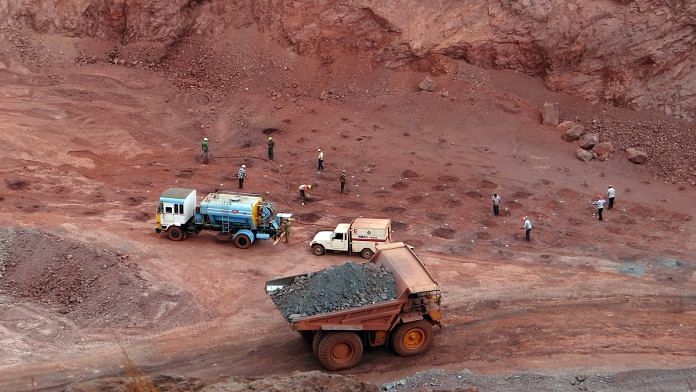New Delhi: The Union Cabinet Wednesday approved amendments to the Mines and Minerals (Development and Regulation) Act, 1957, that will pave the way for commercial mining of six critical minerals — lithium, beryllium, niobium, tantalum, titanium and zirconium — and deep-seated minerals like gold, silver and copper, ThePrint has learnt.
Currently, commercial mining of these critical minerals by private companies is prohibited. Only government agencies were allowed in exploration and mining operations.
These minerals are key components of all modern technologies and go into the making of mobile phones, electric vehicles, solar panels, semiconductors, and wind turbines, among others.
In February this year, the Geological Survey of India discovered a 5.9-million-tonne reserve of lithium in Jammu & Kashmir’s Reasi district.
The amendments, once cleared by Parliament, will also allow the government to grant a single exploration licence to companies through auction.
This is expected to be a big incentive for private companies, especially junior mining companies involved in exploration operations.
Government sources told ThePrint this will allow companies a seamless process — from conducting reconnaissance (exploration) and prospecting operations (undertaken for the purpose of exploring, locating or proving the presence of mineral deposit) to finally getting the rights to mine a mineral resource, once it is discovered and the mine is auctioned.
Currently, the MMDR Act grants private companies a mining lease and a composite licence through an auction for conducting exploration and mining.
“A single exploration licence will encourage more private investment in the sector, where currently private presence is limited,” a government source said.
The source added that the government is currently giving composite licences in a smaller area (up to 25 square kilometres).
“But in the amendments, the ministry has proposed giving an exploration licence for a larger area of up to 5,000 sq km of a single block. The total area with one entity will not exceed 10,000 sq km,” the source added.
The MMDR Act regulates the mining sector in India and mandates the requirement for granting leases for mining operations. This is the fifth time that the MMDR Act, 1957, will be amended.
Nod for commercial mining in offshore areas too
The Union Cabinet Wednesday also cleared amendments to the Offshore Areas Mineral (Development and Regulation) Act, 2002, which seek to allow commercial mining of mineral resources in offshore areas.
Currently, the private sector is not allowed to mine mineral resources in offshore areas, which include territorial waters, continental shelves, exclusive economic zones, and other maritime zones of India under the Territorial Waters, Continental Shelf, Exclusive Economic Zone and Other Maritime Zones Act.
Both the amendment bills, sources said, will be introduced in Parliament during the monsoon session, which starts 20 July.
The two bills, along with the government last month identifying 30 critical minerals that it considers essential for economic development and national security, and India joining the Minerals Security Partnership, a US-led alliance of 14 countries, are expected to ensure self-reliance and address vulnerability in the supply chain of these critical minerals in India.
India is dependent on China and other countries to meet its requirement of critical minerals including Rare Earth Elements (REE), which are the building blocks of modern-day technologies.
(Edited by Anumeha Saxena)
Also Read: How lithium deposits found in J&K could help bring down cost of electric vehicles in India



